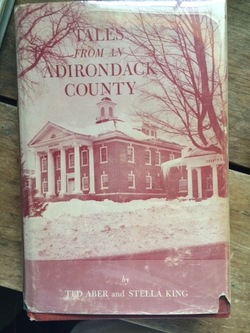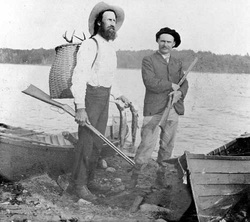
One that caught my fancy was the story of the Lake Pleasant Pot of Gold.
This piece of folklore was passed down from the Civil War era and I’m curious to know whether the myth still circulates. As related by the authors, when the Civil War broke out in 1861 men in the town of Lake Pleasant began practice drills by aiming and shooting at targets hung from a large Elm tree on the farm of Charles Leston where the road to Moffit Beach meets the Speculator-Lake Pleasant highway. It is a telling piece of history that when the book was written in 1961, the authors stated the Elm tree was still standing.
People became especially alarmed when in 1864, armed confederate soldiers robbed three banks in nearby St. Albans, Vermont, stealing $200,000. The target practice at the old Elm became more fervid after that. This new turn of events frightened the local children whenever they passed the Elm tree so a legend grew in the hopes it would comfort them: buried under the roots was a pot of gold.
According to the folklore, to unearth the pot one must dig until it comes into view, then toss coins upon it and the gold will magically appear. During this procedure however, one must not laugh or talk, or make any sound whatsoever or else the pot of gold will disappear.
None of the sources admitted to ever having looked for the pot of gold as a child. Although I wonder how this myth could have survived one hundred years if that was the case.
Perhaps the most famous character chronicled in Adirondack folklore is the guide Alvah Dunning. Indeed, a whole book could be written about Alvah. His antics were also recorded in the Tales from an Adirondack County but were probably first written down in Arpad Gerster’s Notes Collected in the Adirondacks (1895-1898), then Donaldson’s A History of the Adirondacks (1920); Harold Hochschild’s Township 34 (1962); and finally Ruth Timm’s Raquette Lake: a Time to Remember (1989). All reveal first hand accounts of Alvah’s unique belief system such as the earth being flat, not round. “I ain’t believin’ such tommyrot as that!”
Or that all women were ‘pizen’.
His disdain of the city folk whom paid him for his services as a guide, were also well known. He claiming, “they can’t hit a deer if they see it and don’t want it if they do hit it.”
Supposedly Alvah shot the last known moose inhabiting all of the Adirondack forests in 1861 while guiding. It would take almost one hundred years to bring their population back. And the most interesting story of all, he chased down an injured bear on the iced-over Raquette and flattened it by swinging the butt of his rifle at its head.
A tall-tale indeed. What better place to spread it than around a campfire in the woods?

 RSS Feed
RSS Feed
